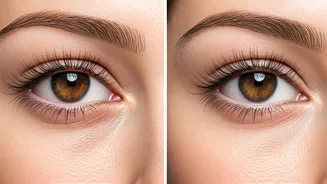Understanding the Culprits
The skin around the eyes is exceptionally thin and delicate, making it prone to showing signs of fatigue and other underlying issues. Several factors contribute
to the formation of dark circles. Genetics often play a significant role; if your parents or close relatives have them, you're more likely to develop them too. Lack of sleep is another major contributor. When you don't get enough rest, your blood vessels dilate, leading to the pooling of blood under the eyes, which appears as dark shadows. Furthermore, aging can worsen the appearance of dark circles as the skin loses collagen and becomes thinner, making blood vessels more visible. Allergies can also trigger inflammation and swelling, resulting in darker pigmentation in the area. Other factors like sun exposure, dehydration, and even your skin tone can exacerbate this concern. Recognizing the root causes is the first step towards finding the right solutions.
Prioritizing Sleep and Rest
Adequate sleep is crucial for overall health and plays a vital role in reducing the appearance of dark circles. Aim for 7-9 hours of quality sleep each night to allow your body to repair and rejuvenate. Create a relaxing bedtime routine to promote restful sleep. This could involve reading a book, taking a warm bath, or listening to calming music. Ensure your bedroom is dark, quiet, and cool, as these conditions are conducive to sleep. Consider using a comfortable pillow to support your head and neck, preventing fluid buildup under your eyes. Avoiding caffeine and alcohol before bed can also improve your sleep quality. By making sleep a priority, you'll not only reduce dark circles but also boost your overall well-being and energy levels. Establishing a consistent sleep schedule can also regulate your body's natural sleep-wake cycle.
Hydration and Diet Tips
Maintaining proper hydration and following a balanced diet can significantly improve the appearance of under-eye circles. Dehydration can make the skin look duller and accentuate dark circles. Drink plenty of water throughout the day to keep your skin hydrated and plump. Aim for at least eight glasses of water daily, and increase your intake if you're exercising or in a hot environment. Incorporate foods rich in antioxidants, such as berries, spinach, and tomatoes, into your diet. Antioxidants help protect your skin from damage and can improve overall skin health. Limit your intake of processed foods, salt, and alcohol, as they can contribute to fluid retention and worsen the appearance of dark circles. Eating a diet rich in iron can also help, as iron deficiency can sometimes be linked to dark circles. Prioritizing these dietary habits can support healthier skin and reduce under-eye darkness.
Skincare Product Essentials
Choosing the right skincare products can be extremely effective in combating under-eye circles. Look for products containing ingredients that specifically target this concern. Retinoids, derived from vitamin A, can help stimulate collagen production, thickening the skin and reducing the visibility of blood vessels. Vitamin C, a potent antioxidant, can brighten the skin and reduce hyperpigmentation. Hyaluronic acid is a great choice as it hydrates the skin, plumping it up and minimizing the appearance of dark circles. Caffeine-infused products can constrict blood vessels, reducing swelling and darkness. Apply your chosen products gently, using your ring finger to avoid pulling or stretching the delicate skin around your eyes. Consider incorporating these products into your daily skincare routine, always following the instructions to maximize their effectiveness. Consistency is key when it comes to seeing results.
Lifestyle Adjustments to Make
Certain lifestyle changes can make a huge difference in the appearance of under-eye circles. If you smoke, consider quitting. Smoking damages collagen and accelerates aging, worsening the appearance of dark circles. Protect your eyes from the sun by wearing sunglasses whenever you're outside. Sun exposure can increase melanin production, leading to darker pigmentation. Reduce your alcohol consumption, as alcohol can cause dehydration and dilate blood vessels. Manage allergies effectively, as allergic reactions can cause inflammation and swelling around the eyes. Consider using a humidifier, especially during dry seasons, to keep your skin hydrated. Practicing stress-reduction techniques, such as yoga or meditation, can also reduce the appearance of dark circles by improving circulation and promoting relaxation. These adjustments, coupled with proper skincare, contribute to long-term improvements.




















